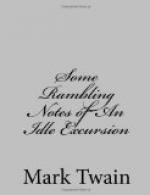At this point we observed that an English flag had just been placed at half-mast on a building a hundred yards away. I and my friends were busy in an instant trying to imagine whose death, among the island dignitaries, could command such a mark of respect as this. Then a shudder shook them and me at the same moment, and I knew that we had jumped to one and the same conclusion: “The governor has gone to England; it is for the British admiral!”
At this moment Mr. Smith noticed the flag. He said with emotion:
“That’s on a boarding-house. I judge there’s a boarder dead.”
A dozen other flags within view went to half-mast.
“It’s a boarder, sure,” said Smith.
“But would they half-mast the flags here for a boarder, Mr. Smith?”
“Why, certainly they would, if he was dead.”
That seemed to size the country again.
IV
The early twilight of a Sunday evening in Hamilton, Bermuda, is an alluring time. There is just enough of whispering breeze, fragrance of flowers, and sense of repose to raise one’s thoughts heavenward; and just enough amateur piano music to keep him reminded of the other place. There are many venerable pianos in Hamilton, and they all play at twilight. Age enlarges and enriches the powers of some musical instruments—notably those of the violin—but it seems to set a piano’s teeth on edge. Most of the music in vogue there is the same that those pianos prattled in their innocent infancy; and there is something very pathetic about it when they go over it now, in their asthmatic second childhood, dropping a note here and there where a tooth is gone.
We attended evening service at the stately Episcopal church on the hill, where five or six hundred people, half of them white and the other half black, according to the usual Bermudian proportions; and all well dressed—a thing which is also usual in Bermuda and to be confidently expected. There was good music, which we heard, and doubtless—a good sermon, but there was a wonderful deal of coughing, and so only the high parts of the argument carried over it. As we came out, after service, I overheard one young girl say to another:
“Why, you don’t mean to say you pay duty on gloves and laces! I only pay postage; have them done up and sent in the Boston Advertiser.”
There are those that believe that the most difficult thing to create is a woman who can comprehend that it is wrong to smuggle; and that an impossible thing to create is a woman who will not smuggle, whether or no, when she gets a chance. But these may be errors.
We went wandering off toward the country, and were soon far down in the lonely black depths of a road that was roofed over with the dense foliage of a double rank of great cedars. There was no sound of any kind there; it was perfectly still. And it was so dark that one could detect nothing but somber outlines. We strode farther and farther down this tunnel, cheering the way with chat.




